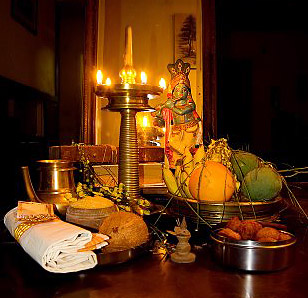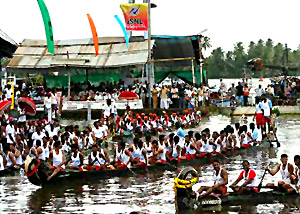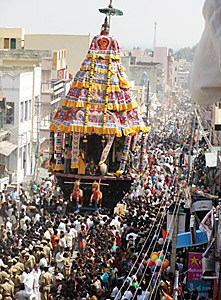The Tamil Calendar is based on the sidereal year (i.e. the time taken for one revolution of the Earth around the sun, or the mean time taken by the sun to return to the same position relative to the background of the fixed stars in the sky). It is derived from the old Hindu Solar Calendar. According to this Tamil Calendar, there are various festivals celebrated in Tamil Nadu. Most of the fairs and festivals of Tamil Nadu are related to religion and temples. Few of the festivals are listed below:
Tamil New Year
 Among all the festivals, the most auspicious one is `pitdlm varuslm pirappu` i, e, Tamil New Year. As per the Tamil Calendar, the New Year is celebrated on 14th or 15th April indicating the beginning of the spring season. On this day the sun rises from the first constellation so it has an astrological significance. All the Tamil people visit to the temples on that particular day and ask for the blessings of the family deity. This month is known as `Chittirai`. On that day the entrance of the house is ornamented with Kollam or colorful decoration. Festoons of mango leaves are suspended on the entrance of the door. Thus Tamilians welcome their new year and then a lavish feast is organised with the family and friends. The main food of the menu remains `Payasam`.
Among all the festivals, the most auspicious one is `pitdlm varuslm pirappu` i, e, Tamil New Year. As per the Tamil Calendar, the New Year is celebrated on 14th or 15th April indicating the beginning of the spring season. On this day the sun rises from the first constellation so it has an astrological significance. All the Tamil people visit to the temples on that particular day and ask for the blessings of the family deity. This month is known as `Chittirai`. On that day the entrance of the house is ornamented with Kollam or colorful decoration. Festoons of mango leaves are suspended on the entrance of the door. Thus Tamilians welcome their new year and then a lavish feast is organised with the family and friends. The main food of the menu remains `Payasam`.
Chittirai Festival
This festival is organised to commemorate the marriage of Sundareswarar to Meenakshi, the sister of Lord Vishnu. It is a 10 -daylong festival celebrated in the month of April or May. On the tenth day of the festival, the marriage ceremony is performed by following all the religious ceremonies. Then a grand procession is taken through the streets of Madurai.
As per the mythology, it is said that on the day of the marriage of Meenakshi, Lord Vishnu reached late for the occasion. It is because he started from his place Alagarkoil, which is 20km from Madurai. The procession of idol of Lord Vishnu is carried in a large palanquin, which is decorated with gold draperies especially for the day. This idol of Lord Vishnu is stopped at various pandals, which are prepared for the occasion all the way through Alagarkoil to Madurai. The Chittirai festival ends on the 11th day with the car festival in the morning and the festival of Lord Alagar (Vishnu) in the evening.
To continue with the festival on 12th day, the Alagar deity moving to various `Mandapas` on the banks of river Vaigai at last stops at Vandiyur to give darshan to the Muslim princess, Thulukka Nachiar Amman. She is said to be a devotee of Lord Vishnu. Vandiyur is a massive tank fed by the water from river Vaigai. The deity seated on `Sesha` (serpent couch) returns to Thenur Mandapa on the next day. Thousands of devotees gather at the place to get a darshan of the Lord. On the 14th day, the procession becomes more magnificent as it is said that on that day Lord Alagar takes the Mohini avatar and leaves for his residence Alagarkoil on the 15th day.
Summer Festival
 This is an annual festival of Tamil Nadu Ooty (Udhagamandalam), Kodaikanal, Yercaud, Yelagiri and Kolli Hills. It is celebrated with lots of splendour during the summer season. During this festival, various cultural programmes, adventure sports, boat races, flower and fruit shows are organised.
This is an annual festival of Tamil Nadu Ooty (Udhagamandalam), Kodaikanal, Yercaud, Yelagiri and Kolli Hills. It is celebrated with lots of splendour during the summer season. During this festival, various cultural programmes, adventure sports, boat races, flower and fruit shows are organised.
Mango Festival
According to Tamil Calendar, this Mango festival is celebrated in the month of June. Mango is the `king of fruits` and the mango lovers of Tamil Nadu enthusiastically celebrate this festival at Krishnagiri. A lot of varieties of delicious mangoes are displayed in this festival like Alphonso, Malgoa, Rumani, Banganapalli, etc. Many buyers and sellers from all over come here to be a part of this festival. Himampasan from Trichy/Srirangam area is one of the rare varieties of mango displayed mainly for export purpose.
Saral Festival
This festival is celebrated in the month of July according to the Tamil Calendar. During this festival, all the visitors of Courtallam resort flock to perform a ritualistic bathing revitalizes the body. To add more colour to this Saral Festival, various cultural shows and competitions are organised. In this season, Courtallam with its nine waterfalls becomes tourists` attraction point, as the water is believed to have curative powers. The water falls on the rocks and small droplets are sprinkled in to the air, giving a `fog like` appearance. Then the strong breeze carries this fog further, a phenomenon called `saral` in Tamil.
Adi Perukku Festival
This festival is celebrated on the 18th day of Tamil month, which is called as Adi. It is organised at Bhavani, Hongenekkal to welcome the gushing waters brought by the monsoons. The beginning of the new harvest season is marked by this festival. People float their offerings on the goddess river Kaveri. They thank the goddess for the bounty, for the food they eat and they also prepare and eat different varieties of cooked rice on the riverbanks.
Vaikuntha Ekadashi
This festival is celebrated during the month of December to January. It is believed that on this Ekadashi day, the gates of heaven remain open. So, a fast performed on that day washes away all the sins of the person. Vaishnavaite shrines are decorated with gate, Vaikuntha Vasal and a threshold of paradise is also erected so that the devotees can pass through this gate.
Karthikai Deepam
 This festival starts on the first day of the Tamil month `Karthikai`. A million of pilgrims gather at the Arunachala Hill in Tiruvannamalai for this festival, which occurs from November to December. A huge fire is lit for the occasion and thousand of liters of ghee are poured in it with bales of cloth for wick, on top of the hill for days together. The flames are regarded as the Siva`s lingam of fire. Lamps are lit at the homes of all the people to honour Siva and his fiery lingam.
This festival starts on the first day of the Tamil month `Karthikai`. A million of pilgrims gather at the Arunachala Hill in Tiruvannamalai for this festival, which occurs from November to December. A huge fire is lit for the occasion and thousand of liters of ghee are poured in it with bales of cloth for wick, on top of the hill for days together. The flames are regarded as the Siva`s lingam of fire. Lamps are lit at the homes of all the people to honour Siva and his fiery lingam.
Pongal Festival
This is the main festival of Tamil Nadu celebrated on January 14 or 15. It is a festival of harvest so it is also known as harvest festival. During this festival, cleaning, rejoicing, sharing and thanksgiving are done.
Few other important Festivals of Tamil Nadu as per Tamil calendar are the float festive (February -March) in Chennai and Madurai, Vinayaka Chathurthi, Deepavali, besides festivals of Buddhists (Buddha Poornima, May), Jains (Mahavir Jayanthi) Muslims (associated with the Prophet and saints) and Christians (Christmas).









